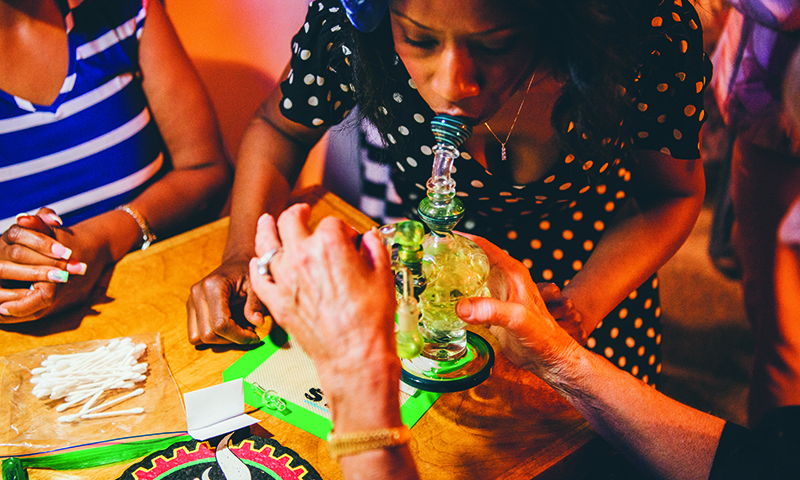
On a sticky Sunday in June, Anqunette Jamison Sarfoh barely breaks a sweat as she moves among some five dozen chatty women who are crowded into a small, cacophonous pot-smoke-filled vestibule. Sarfoh, statuesque in a black dress with white polka dots, is usually uncomfortable in warm, tight spaces as heat exacerbates symptoms of her multiple sclerosis, but little could bother her today. All around her at a house in downtown Detroit shared by a pro-cannabis law firm and a yoga studio, a gaggle of invitees discuss, breathe, and nosh on all things cannabis-related as they wait for the main event room to open.
“Watch how this works,” the 47-year-old former Fox 2 Detroit morning show anchor tells those close enough to hear. She places a long plastic bag over a nozzle atop a UFO-looking device known as a vaporizer and pushes a button. After the bag expands with colorless, aerated marijuana pumped from bowels of the vaporizer, Sarfoh seals it with an orange stopper. She then hands it to a slightly startled, well-coiffed middle-aged blonde who frees her hand by shoving a gold lamé purse under her arm and takes a hit. “See how smooth that is?”

As guests feast on a salad with a pot-infused dressing and sip tea brewed with cannabidiol (CBD) oil prepared by High Times magazine’s 2017 Michigan Top Chef Gigi Diaz, Sarfoh sits at a head table with her featured guest, registered nurse Cathleen Graham, who has made a career of advocating and educating people on the health benefits of marijuana. Over the next 90 minutes, in an event Sarfoh dubbed “High Tea,” the two women offer a seminar on the health benefits of using marijuana in an array of forms.
“I wanted this to be women only because we’re gonna talk about some sensitive issues that cannabis can treat,” Sarfoh coos in a reassuring but assertive lilt honed from her decades on morning television.
For perhaps the first time in years, Sarfoh is fully in her element. She made her name in Detroit as a trusted presence to wake up to before her MS forced an early retirement in 2016. But through that illness, she discovered the benefits of medicinal marijuana and her second act — as a pot evangelist and then as a pot entrepreneur as co-owner of Botaniq, a dispensary in Corktown.
The free High Tea event, then, was a clever opportunity for Sarfoh to merge these two personae. “My neuropsychologist is always reminding me that even though I’m not informing people like I used to, I still have a passion for informing people,” she tells me. “I like for people to know things and be smarter. I can’t just sit at home and keep it all to myself.”
Before she was diagnosed, Sarfoh took little interest in the politics or business of marijuana. Nor, for that matter, did she give much serious thought to MS until 2012 when Fox aired an interview with Courtney Galiano, a finalist on So You Think You Can Dance who had come out as having the neurological disease that strips people of their control over their bodies.
Many symptoms Galiano described were familiar to Sarfoh, who had been vexed for years by memory loss and a habit of losing her train of thought. Then, in recent months, Sarfoh’s legs had fallen asleep while she walked her dog. One time, she was bringing groceries into her Farmington Hills home when she faceplanted. “My legs just stop working,” she says. “I distinctly remember the oranges rolling across the floor because they ended up in my husband’s home office. It was terrifying.”
During an ad break from the Galiano interview, Sarfoh took an online MS assessment quiz, scored 8 out of 10 and then googled Detroit neurologists. Several doctor’s visits, some brain scans, and two spinal taps later, Sarfoh was diagnosed in November 2013 and put on a buffet of medication. “My doctor said, ‘Your job will put you in a wheelchair,’ ” she recalls. “He says, ‘It’s stressful. You have to get up every morning at 3 o’clock. You’re not sleeping well. You should consider not doing this.’ ”

Sarfoh officially retired from Fox 2 in a Facebook video in October 2016. She’d wanted to be a reporter since she was a second grader in Gary, Indiana, had gotten a journalism degree at Butler University, and worked her way up to the plum Detroit gig through years of toil in West Lafayette and South Bend, Las Vegas, and Boston. “When I got to Detroit, I knew this was going to be the place I would end my career,” she says wistfully. “It just ended sooner than I thought.”
In June 2016, Sarfoh and her father drove to Colorado so he could try cannabis edibles. Her father lives in Indiana, where it is not legal for any purpose, and he suffers respiratory issues that hinder him from smoking. The road trip’s destination was Sweet Mary Jane, owned by a cannabis cookbook author who had inspired Sarfoh to dream about starting her own edibles bakery.
By then, Sarfoh had been using weed to allay symptoms of MS for a few years. Her husband, Richard Sarfoh, urged her to try it as she struggled with nine prescription medications that she said only made her sicker. “I smoked a joint and the nausea went away, the headaches went away, it gave me energy,” she says. “I was able to wean myself off of all the other drugs.”
This awakening sharpened her awareness of problems with marijuana criminalization — disproportionate prosecution of minorities, seizure of personal assets regardless of guilt, the limited number of ailments for which medical pot was legal in Michigan — and jolted her into action. Sarfoh shed the neutrality required of her as a journalist and lent her voice to the activist group MI Legalize as it geared up in late 2016 to put a referendum on the 2018 ballot to lift the ban on recreational use by adults.
At the same time, the Sarfohs contacted a real estate agent about opening a cannabis bakery. Instead, the agent routed them to an investment group struggling to get approval from the North Corktown Neighborhood Association to open Botanic, a proposed medicinal marijuana dispensary. In 2017, the couple partnered with those investors, and the notable former TV anchor successfully persuaded locals that her pot shop would have class. The name was soon after changed to Botaniq — a nod to the “Q” that had long been Sarfoh’s on-air nickname — and it opened on Election Day 2018 as Michiganians also went to the polls to overwhelmingly legalize recreational marijuana.

This summer, the Sarfohs accepted a buyout offer estimated to be effective in September. The sale has freed the couple up to spread their wings. As of mid-summer, they had put in an application to open a dispensary in Madison Heights and were negotiating a partnership with a less successful Detroit pot dispensary. The High Tea event, which she hopes will become a semi-annual event, and the founding of CuriosiTea, a monthly educational gathering for cannabis-curious women that launches on Oct. 17 at a Detroit “bud and breakfast” called Copper House. Her aim is to destigmatize cannabis for groups — women, the elderly, religious people — who she feels can benefit from its use.
The conversation she leads at High Tea is a prime example of what she sees as her role in the Detroit community — in her words, “a cannabis and wellness advocate.” Under her gentle questioning, the nurse explains the difference between THC, the ingredient that produces a high, and CBD, an oil extract from cannabis that offers some of the health benefits without the mind-altering impact of the drug. Members of this audience aren’t only newbies; along with Sarfoh, others tell how they used to overcome joint pain, to control diabetes, and to allay anxiety.
“When I first started medicating my son with cannabis oil, it was not the norm, so watching Anqunette go through what she did helped me be proud of medicating Jaden’s autism in a natural way,” says Amie Carter of Burton. “With that, I got him off of 90% of his pharmaceuticals. He’s doing very well.”
The room erupts in applause, and all eyes turn back to Sarfoh, ever the congenial hostess. “That’s what this is about,” she tells me later. “I want to help people be comfortable with this. If I can do that, I’ll consider this part of my life to be a success.”
|
|
|











